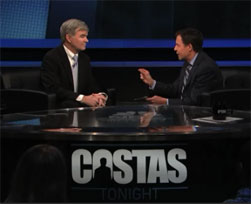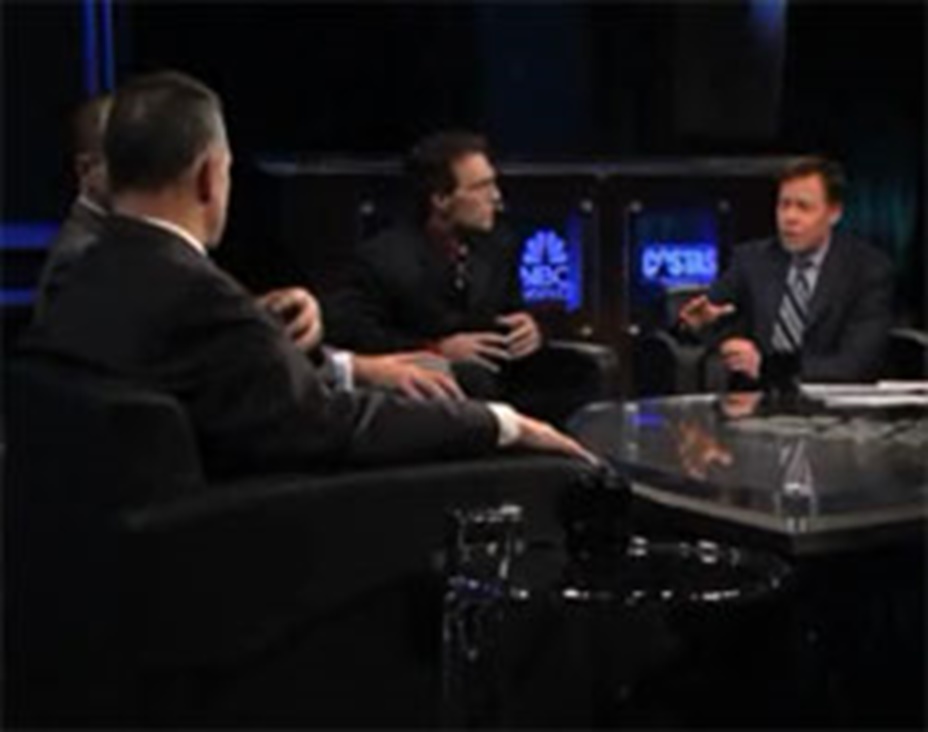The state of college sports was the subject of last night's two-hour “Costas Tonight” episode on NBC Sports Network. Host Bob Costas opened the show by saying, “Welcome to what we hope is a wide ranging, provocative and entertaining discussion on the state of college sports.” The show covered multiple topics, including pay-for-play, amateurism, NCAA reform and Title IX. Excerpts from the show follow ("Costas Tonight," NBC Sports Network, 4/4).
ONE-AND-DONE BAD FOR SPORTS?
ESPN's Jay Bilas: I think if the players are committed to being pros and they've got all the information to make the decision, I don't think there's anything wrong with it. Because other students get to leave whenever they want. Professors leave when they want. ... Coaches leave. Everybody gets to leave. And the players are supposed to stay for four years, when it's not in their interests sometimes to do it, I don't think that's fair. ... Every school's different. So if they're meeting the requirements of that school it's kind of this NCAA narrative that they're students first and they just happen to be athletes. That's ridiculous. They're players and they're allowed -- what difference does it make what order do they have? Am I a lawyer first or a broadcaster second? Or how does that all fit? Husband and father? Where does it all fit?
South Carolina men's basketball coach Frank Martin: The one and done is a bad rule. Kids should have the option to go right out of high school or as a ninth grader. ... Anytime you've got a chance to go work and the opportunity is there, you should have that right. ... You want to protect the university against the one and done rule, then make freshmen sit out and go back to 15 scholarships.
Bilas: Every school can handle their own students. We don't regulate how they offer up a music scholarship and whether they're going to let in an alum kid when he's not as qualified as another. We're outthinking this. And I think these schools can determine how they're going to educate a kid, who they're going to give a degree to, what their grades are.
ON THE SYSTEM:
Costas: You have characterized the relationship between universities and athletes, at least in the revenue producing sports, as essentially one of exploitation.
N.Y. Times' Joe Nocera: It's unpaid labor. It's a $6 billion business with an unpaid labor force. It's unethical and immoral, yes.
Costas: For all the flaws, isn't it a reasonable argument to say: Look, it's not unpaid labor really. A full ride for four years or five could be worth a couple hundred thousand dollars. If the kid takes advantage of that, he gets an education, he gets a showcase for his skills if he's a pro prospect. He gets to play a sport he loves and enjoys. He gets top quality coaching. He gets a terrific experience.
Nocera: It's a mild overstatement, but it's not much of one. ... Let's talk about the reality. The reality is that college athletes have jobs that come first, that absolutely come before academics. Academics are second, third, fourth on the list. And many of the players who when they finish up their eligibility, they don't graduate.
Costas: How would paying them improve the relationship between them and their books and their classrooms?
Nocera: It infuses an element of honesty in it, in the situation. You're being honest about what's actually going on here. Why did we use the phrase "student athlete," the phrase? We use it because the NCAA invented it because they were worried that certain states were going to start classifying football players as employees and they would get workmen's compensation.
Agent Drew Rosenhaus: It would be more equitable, Bob, to reward the players, at least allow them to get a stipend. I'm not advocating wholesale changes. That's not realistic at this point. ... The athletes deserve more than what they're getting. I think it's great that they get the great college educations, scholarships, housing, food, etc., but it's not equal to what they're giving up. They can't go out and make appearances. They can't get other jobs. They're giving so much of themselves to playing this game. Let them get a little bit more.
Former Nike, adidas and Reebok exec Sonny Vaccaro: What I'm saying to the public is the NCAA has the audacity to keep all the money from all the films and all the jerseys all these kids played in 40 and 50 years ago and don't give them a penny. This is after they've left their universities, ladies and gentlemen, people watching on television.
Rosenhaus: That is wrong. There's no question with all the sales on the jerseys, the video games and all the money, there's got to be a way to distribute some of that to the players that make it possible.
Vaccaro: What should happen, and God willingly it does happen, the [Ed] O'Bannon case wins. We need it to win now for all the future student athletes that don't even know what they're fighting for.
Costas: It's possible that if the O'Bannon suit [wins], it wouldn't be confined to just the outcome of that case. It could have a very large ripple effect.
Vaccaro: How in the hell can the NCAA put on a commercial in front of the world and say: "You think we're dumb jocks?" I thought that was the most appalling thing I've ever seen in my life. I'm more disgusted with the NCAA because they are saying that they think that those kids playing on the basketball court are dumb jocks. I never thought that in my life. Never once did I ever think that.
Costas: They would say they're refuting that characterization.
Vaccaro: No. There is nothing to refute, because it shouldn't be something that's included. ... No one should be referred to as a dumb jock. And it certainly shouldn't come in front of the world and running on the damn thing over and over again in front of 20 million people.
NBC's Doug Flutie: The number one aspect is it's college; you're there as a student. You're playing the sport. Yes, you're making money for the university while you're there, but the university is the one that built the stadiums, put the money in, took all the risk in the first place. You're there to get an education. You have over $200,000, in most cases, worth of scholarship, as well as benefits from it. And then you make out of your opportunities what you can as you go after.
ONE-ON-ONE WITH NCAA PRESIDENT MARK EMMERT:
 |
Emmert (l) says that he advocates at least a
$2,000 stipend for college athletes |
Costas: Joe Nocera has characterized NCAA enforcement as a star chamber. You heard Dale Brown characterize it as a cartel that abuses its power. Want to respond?
Emmert: I didn't know I was running the Cali Drug Cartel. But here's what the NCAA does: All of college athletics provides $2 billion, more than $2 billion, in scholarship support for student-athletes. There's 400,000 student-athletes who graduate, the vast majority, 95, 96% of them, graduate at levels higher than the rest of the student body. They get a chance to participate in all the sports that they want to and develop their skills at the very highest level. If they're that 1% that has the ability to go on and play professional sports, they want to pursue that, there's no better place to get that training and experience. And they get promoted on this wonderful stage that you and others put on for them. If that's some kind of a cartel, then I guess I'm not embarrassed to run it.
Costas: If you lose the O'Bannon suit, that could have a ripple effect. ... Couldn't the NCAA loosen it up a little bit?
Emmert: There's not enough time to explain why I think paying student-athletes $50,000 is a bad idea. ... I've been advocating for at least a $2,000 miscellaneous expense allowance consistent with what it really costs to be a student-athlete. We heard stories about somebody's computer being broken and a parent of a rich kid can get it fixed but an athlete can't. That's not true any longer. We put $60 million a year into a fund every year for student athletes to get those kinds of things fixed and taken care of. We need to make sure that we're giving our student-athletes as legitimate students all the support they need, including financial support, and we don't do that now.
CLOSING THOUGHTS
Bilas: There's so many good things that are going on in college sports. But there's some things that are wrong. It's not administered well. College sports are great. There's nothing wrong with the games, there's nothing wrong with the athletes and the coaches. I think the game's poorly administered. ... When Mark Emmert talks about we don't want the game professionalized, okay. But there's a lot of room in between. And that's where we've got the problem. They're putting out strict amateurism thing. What does amateurism do for the athlete? Doesn't make them a better student. Doesn't make them a better person. Doesn't make them a better teammate.
Former college basketball coach Dale Brown: Mark Emmert, no doubt, is the most available director, president of the NCAA ever. ... What I said earlier, and I really believe this, I think he can be the beacon light.





